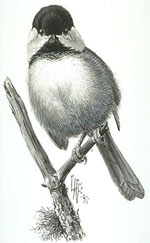 Many people do not know that the Migratory Bird Treaty Act makes it illegal to disturb the nest any native bird without a permit.
Many people do not know that the Migratory Bird Treaty Act makes it illegal to disturb the nest any native bird without a permit.
The Migratory Bird Treaty Act is the primary legislation protecting native birds in the United States and one of this country's earliest environmental laws. It prohibits the "taking" any native birds; "taking" can mean killing a wild bird or possessing parts of a wild bird, including feathers, nests, or eggs. Exceptions are allowed for hunting game birds and for research purposes, both of which require licenses or permits. It is also illegal to try to incubate wild bird eggs, to keep nests or eggs even for "show and tell" educational purposes, or to have road-killed birds in your possession without a permit. (Note: Injured native birds should be brought immediately to a licensed, trained wildlife rehabilitator who handles such species.)
It is illegal to remove or move nests that contain eggs or nestlings, even if:
 It is illegal to transport, trap or kill native non-game adult birds like Blue Jays or Mockingbirds without a permit, even if they are harassing birds at nest boxes or feeders.
It is illegal to transport, trap or kill native non-game adult birds like Blue Jays or Mockingbirds without a permit, even if they are harassing birds at nest boxes or feeders.
Despite the title, the Act also protects birds that are not considered "migratory" (like eagles, hawks, and Chickadees).
Permits are seldom granted to individuals, even for research. A State permit may be required in addition to a federal permit - contact your state game warden/wildlife management agency for more information.
Do not move a nest, bring eggs inside to keep them warm, incubate abandoned eggs, etc. - even if you are trying to help. Besides being illegal, you will probably do more harm than good.
Technically, you should not transport orphaned eggs or nestlings, touch adults or young, or bring an injured bird home to help it - in Maryland, only a licensed wildlife rehabilitator can do that.
A list of protected birds is available here. Introduced bird species (like House Sparrows, European Starlings, Rock Pigeons and Mute Swans) and captive-bred game birds (like domestic mallards) are not protected by federal law. Mute Swans, however, are protected by State law.
Enforcement
The U.S. Fish & Wildlife Service is responsible for administering this Act. While the law is not often enforced, penalties are severe - up to six months in jail and a fine of up to $15,000. Equipment used to pursue, hunt, or trap can also be seized. To report violations of the Migratory Bird Treaty Act in Maryland, please contact the U.S. Fish and Wildlife Service’s Northeast Regional Office (Division of Migratory Birds) at 413-253-8643 or the Maryland Natural Resources Police at 800-628-9944.
 History
History
This act has its roots in late nineteenth-century opposition to the millinery trade. The fashions of the 1880s and 1890s favored hats adorned with real feathers and stuffed wild birds. The most popular feathers were the long plumes of egrets and herons. The trade in feathers took a tremendous toll – 200 million wild birds per year by some estimates. Populations of the most hunted species declined precipitously. Then people, including hunters, became concerned about wholesale slaughter of certain species. This prompted passage of the Migratory Bird Treaty Act in 1918. Before this law was passed, hunting of non-game birds was basically unregulated.
Injured or Nuisance Wildlife?
Click here for a list of Maryland Wildlife Rehabilitators and Wildlife Damage Control Operators
Most of the time, when people encounter wild animals, they are filled with excitement and wonder. However, there are times when being face-to-face with nature poses a new set of problems and most people simply don't know what to do. DNR's Wildlife and Heritage Service and the U.S. Department of Agriculture (USDA) have teamed up to provide you with a Toll-free 877 phone number to report nuisance, injured or sick wildlife situations.
To report nuisance, injured or sick wildlife,
Call Toll-free in Maryland: 1-877-463-6497.
References:
Birds Protected by the Migratory Bird Treaty Act:
•
https://www.fws.gov/law/migratory-bird-treaty-act-1918
Digest of Federal Resource Laws of Interest to the U.S. Fish and Wildlife Service
•
http://www.fws.gov/laws/lawsdigest/migtrea.html
Sialis- All about bluebirds:
•
http://www.sialis.org